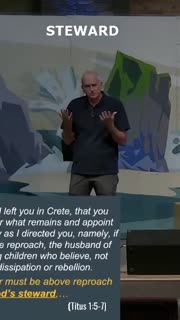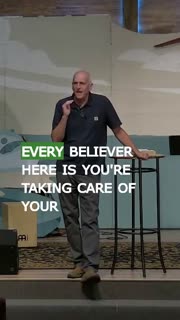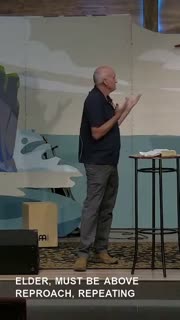Stewarding God's Glory: Elders and Every Believer
Devotional
Sermon Summary
Bible Study Guide
Sermon Clips
### Quotes for Outreach
1. "God is about His glory, and specifically, Paul is writing to Titus about the church here, and certainly, if God's agenda is His glory, and He's working that out in creation, His church is for His glory. In fact, Ephesians 3, the very last verse or two of Ephesians chapter 3, it says, And then it says, And through Jesus Christ, in all generations forever and ever, amen. So, to Him be the glory in the church." [35:21] (37 seconds)
2. "To glorify God, if God has done, this much worth and this much significance and this much value, that's who He is. And none of us, none of us until heaven, accurately see Him as He is and have a proper perspective of Him being as great as He is. But some people think He's this good, some people think He's this good or this good. To glorify Him is to increasingly, have an increasingly accurate estimation of His worth and value." [37:16] (28 seconds)
3. "You're a steward of the life that God has given you. Right? It's not your own. Just to spend the way. I think what I'm going to do today, this is how I'm going to spend my life. You're stewarding the life that God gave you. It's his, and you're taking care of that for him, for his glory." [54:03] (18 seconds)
4. "As each one has received a special gift, employ it in serving one another as good steward. It's not talking about elders here. These are believers. God has gifted you as a believer. Employ it as good stewards of the manifold grace of God. Why? So that. Why are you a steward the way that God has gifted you and made you in the body? Why are you to steward that and use it in serving one another? So that God may be glorified in all things." [54:36] (32 seconds)
5. "Every believer here is you're taking care of your life, your gifting, the relationships that you've been put next to, and they are all for his glory. Which means as a result, people around you, other believers that you're interacting with here in the church body, in your neighborhood where you work, in your family, in your home, as a result of knowing and walking alongside you, they have an increasingly higher view of who he is. So they're seeing him more and more accurately." [56:14] (35 seconds)
### Quotes for Members
1. "So here's the first one. The husband of one wife. And churches have interpreted this in one of two ways primarily. Well, actually a few different ways, but primarily two ways. Some churches interpret this to mean that someone that serves as an elder can't be divorced. And that's not my interpretation. I'm going to share with you what mine is and what I think Grace Point's is. But, I mean, could I attend a church that interpreted the Scripture that way? Absolutely I could. Because they're trying to look at the Scripture and say, this is what we think this believes, what this means." [42:12] (31 seconds)
2. "So I think this is the second reason in letting Scripture interpret Scripture. I'm saying, here's the qualification available. It's the fact that the man has his children are under control. Otherwise, it's not that he's not a believer. It's that he needs to give attention to his family, and pastor and shepherd them. So I think because of Timothy, and because of what comes right after faithful children, I think it leads us to say this is how it should be interpreted. That these are faithful children who are not living these wild lives, not submitting to authority. They're living, as Timothy says, in an orderly way." [49:30] (45 seconds)
3. "For the overseer must be above reproach as God's steward. And that's who he is. That's what an elder is. They are steward. A steward is someone who takes care of something that's not his own, for the owner. Right? Jesus tells, a number of parables about stewards. Right? So here's what an elder is. And the church is not yours. Right? The church is not the elder's church. Used to get so aggravated. Sometimes people would say, well, I go to Jimmy's church back in the day, or I'm going to Bobby's church. It's not... Bobby, I hate to break it to you. He knows. It's not Bobby's church." [50:28] (38 seconds)
4. "So just a quick application within the church. I want to say this and we're going to pray and say amen. So one of the ways, it's important for us to be in relationship with other believers. More than just walking in on Sunday morning and going out. Right? And so one of, part of my role here being new here is to help strengthen and encourage and grow the small group ministry, the D group ministry. It's important for us to, whether it's meeting in homes or meeting on, here on Thursday nights or Wednesday nights with a group of believers, some spending time with them." [01:12:11] (32 seconds)
5. "No one's nailing this. Right? If these qualifications mean this person is like this 100% of the time and never, never deviates, then the elder meetings are going to be really short because no one's going to be there. Right? What we're talking about in these qualifications is like this is what characterizes this person's life and they are moving, they are growing in these areas and they haven't arrived. None of us have arrived yet, right? So just give it grace and understanding that sanctification is a process." [01:14:51] (37 seconds)
Ask a question about this sermon
1. "God is about His glory, and specifically, Paul is writing to Titus about the church here, and certainly, if God's agenda is His glory, and He's working that out in creation, His church is for His glory. In fact, Ephesians 3, the very last verse or two of Ephesians chapter 3, it says, And then it says, And through Jesus Christ, in all generations forever and ever, amen. So, to Him be the glory in the church." [35:21] (37 seconds)
2. "To glorify God, if God has done, this much worth and this much significance and this much value, that's who He is. And none of us, none of us until heaven, accurately see Him as He is and have a proper perspective of Him being as great as He is. But some people think He's this good, some people think He's this good or this good. To glorify Him is to increasingly, have an increasingly accurate estimation of His worth and value." [37:16] (28 seconds)
3. "You're a steward of the life that God has given you. Right? It's not your own. Just to spend the way. I think what I'm going to do today, this is how I'm going to spend my life. You're stewarding the life that God gave you. It's his, and you're taking care of that for him, for his glory." [54:03] (18 seconds)
4. "As each one has received a special gift, employ it in serving one another as good steward. It's not talking about elders here. These are believers. God has gifted you as a believer. Employ it as good stewards of the manifold grace of God. Why? So that. Why are you a steward the way that God has gifted you and made you in the body? Why are you to steward that and use it in serving one another? So that God may be glorified in all things." [54:36] (32 seconds)
5. "Every believer here is you're taking care of your life, your gifting, the relationships that you've been put next to, and they are all for his glory. Which means as a result, people around you, other believers that you're interacting with here in the church body, in your neighborhood where you work, in your family, in your home, as a result of knowing and walking alongside you, they have an increasingly higher view of who he is. So they're seeing him more and more accurately." [56:14] (35 seconds)
### Quotes for Members
1. "So here's the first one. The husband of one wife. And churches have interpreted this in one of two ways primarily. Well, actually a few different ways, but primarily two ways. Some churches interpret this to mean that someone that serves as an elder can't be divorced. And that's not my interpretation. I'm going to share with you what mine is and what I think Grace Point's is. But, I mean, could I attend a church that interpreted the Scripture that way? Absolutely I could. Because they're trying to look at the Scripture and say, this is what we think this believes, what this means." [42:12] (31 seconds)
2. "So I think this is the second reason in letting Scripture interpret Scripture. I'm saying, here's the qualification available. It's the fact that the man has his children are under control. Otherwise, it's not that he's not a believer. It's that he needs to give attention to his family, and pastor and shepherd them. So I think because of Timothy, and because of what comes right after faithful children, I think it leads us to say this is how it should be interpreted. That these are faithful children who are not living these wild lives, not submitting to authority. They're living, as Timothy says, in an orderly way." [49:30] (45 seconds)
3. "For the overseer must be above reproach as God's steward. And that's who he is. That's what an elder is. They are steward. A steward is someone who takes care of something that's not his own, for the owner. Right? Jesus tells, a number of parables about stewards. Right? So here's what an elder is. And the church is not yours. Right? The church is not the elder's church. Used to get so aggravated. Sometimes people would say, well, I go to Jimmy's church back in the day, or I'm going to Bobby's church. It's not... Bobby, I hate to break it to you. He knows. It's not Bobby's church." [50:28] (38 seconds)
4. "So just a quick application within the church. I want to say this and we're going to pray and say amen. So one of the ways, it's important for us to be in relationship with other believers. More than just walking in on Sunday morning and going out. Right? And so one of, part of my role here being new here is to help strengthen and encourage and grow the small group ministry, the D group ministry. It's important for us to, whether it's meeting in homes or meeting on, here on Thursday nights or Wednesday nights with a group of believers, some spending time with them." [01:12:11] (32 seconds)
5. "No one's nailing this. Right? If these qualifications mean this person is like this 100% of the time and never, never deviates, then the elder meetings are going to be really short because no one's going to be there. Right? What we're talking about in these qualifications is like this is what characterizes this person's life and they are moving, they are growing in these areas and they haven't arrived. None of us have arrived yet, right? So just give it grace and understanding that sanctification is a process." [01:14:51] (37 seconds)










